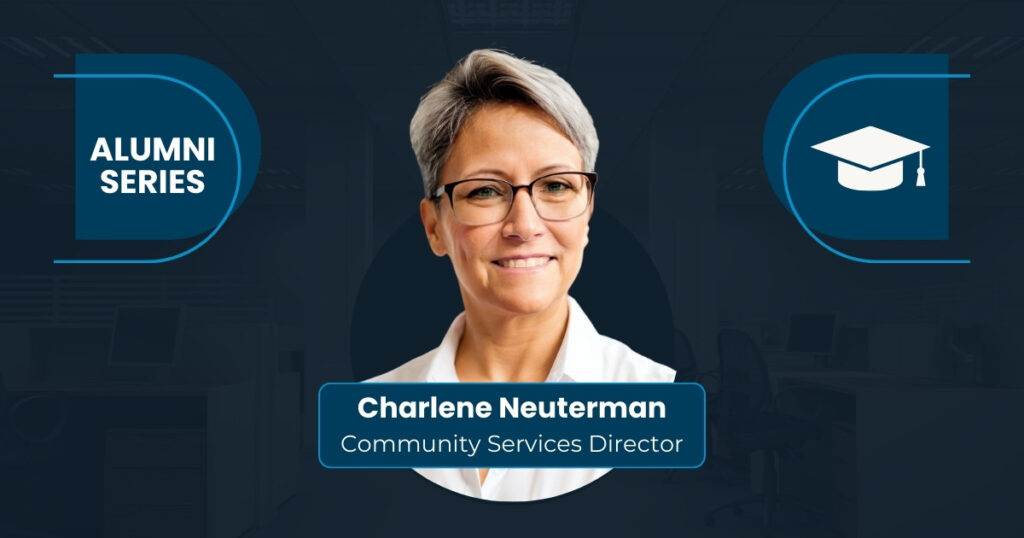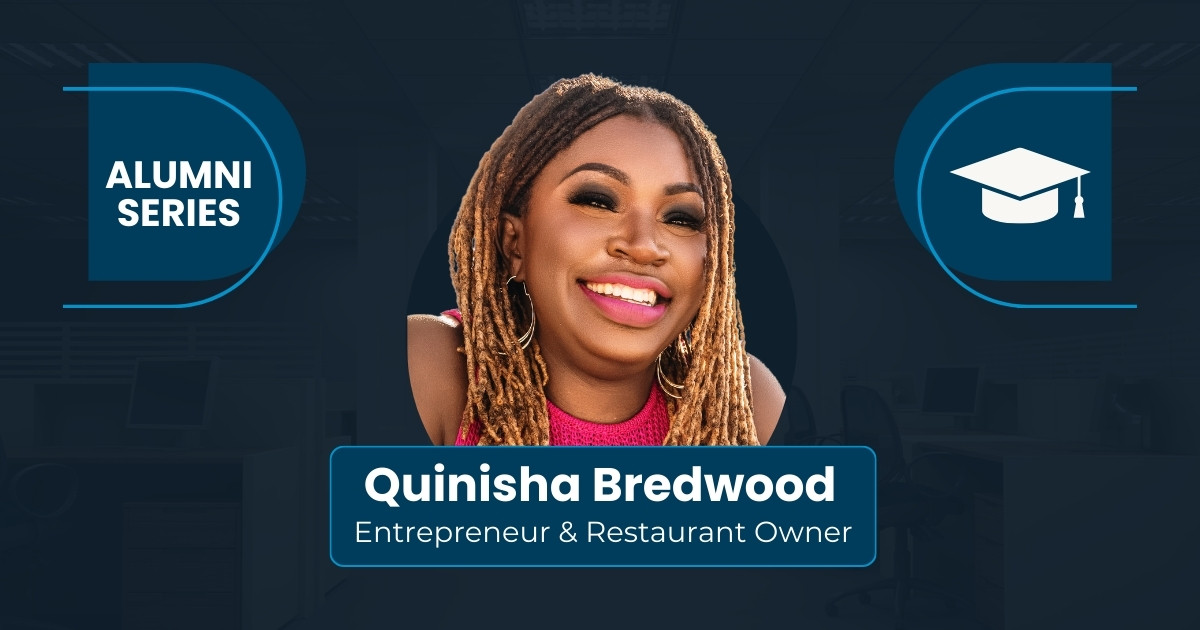Charlene Neuterman began her journey as an undergraduate at Eastern Florida State College (then BCC). Today, she works as the Community Services Director for City of Cocoa, improving the lives of others and their community every day. In this Alumni Spotlight feature, Charlene shares her story, including advice for picking an academic major and the important role that volunteering played in shaping her professional skills.
Tell me 3 fun facts about you.
I am a long-time Boy Scouts of America volunteer in Brevard County. My favorite holiday is Halloween. My husband and I decorate our yard and our house for Halloween every year. I’m an avid cruiser. I love taking cruises with my family and friends and try to schedule several every year.
Tell me a little bit about your background.
I grew up here in Brevard County. I’m a product of Titusville High School, where I played softball. From that, I earned a scholarship to play softball at Brevard Community College (EFSC) for two years and was a pitcher for the team. After I graduated from Brevard Community College, I went to Florida State University, where I majored in education. After graduation, I came back to Brevard, got married to my husband and began raising my family.
I worked for US Space Camp Foundation for many years and developed curriculum for them and their youth program. After that, I worked for the Brevard County Sheriff’s Office’s community services programs. Now I’m at the City of Cocoa, where I’ve been for almost 15 years. I started as a grant writer and worked my way through different positions of project management and grant management. Now I’m the Community Services Director.
What is it like being a Community Services Director?
In the Community Services Department, I oversee building and permitting our community redevelopment agencies and our housing and neighborhood services. My team’s goal is to ensure that all our buildings are safely built or renovated to the Florida Building code. It takes a lot of time and effort to read a set of plans and understand the contractor’s vision to facilitate their project.
I oversee the Diamond Square redevelopment area. It was considered one of our most impoverished areas in the City of Cocoa, and over the last 20-25 years we have built it up to be a cleaner, safer, and more functional environment for all of our residents. We provide services to the community and make infrastructure improvements to sidewalks, streets, and stormwater to prevent disasters. That takes a lot of communication. I spend most of my time at meetings with our residents and our board members, helping them understand why we do what we do in the community.
Then, of course, we have housing and neighborhood services. We facilitate programs that rehab older homes. We recently built five new homes for residents at a cost much less than the actual cost to build the home. The city did this project to improve and increase the homeownership opportunities in the community. We want to see people purchasing homes and living in their homes. Additionally, a couple of years ago, we partnered with Habitat for Humanity. We built six new homes for female veterans and we have a Female Veterans Village here in Cocoa. It’s the one and only of its kind in the Habitat for Humanity world. We love what we do. We really enjoy improving the city one step at a time.
How did you get interested in this type of profession?
When I worked for Space Camp, I found out I was halfway decent at grant writing. Then, at the Sheriff’s Department, I wrote some grants for their community programs, and after that I came to the City of Cocoa as the grant writer for the city. I really have a passion for writing grants for programs and projects that will benefit the community.
I’ve always been a community-centered person who likes to help others through volunteering. I think that’s a good reason to get involved in community service — learning fundamental skills while making a difference. As I grew in with my career here at the City of Cocoa, I was able to use my communication, writing, and project management skills to get me to where I am today. Being a Community Services Director takes a little bit of all of that. I still write and manage grants, do a lot of communicating with different groups of people, and am in front of the public on a regular basis.
I love what I do because I get to interact with the community and see the successes we are facilitating here in Cocoa. When we open new parks and new communities, I see the happy faces and the smiles, so that really makes my life and my job feel successful.
How did you get your first professional opportunity?
I kind of jumped around in career paths. Over the last 30 years, I didn’t actually know what I wanted to be when I grew up. I thought that I wanted to be in education, but I realized that the type of education I wanted to do was not classroom-related, but outside the classroom – the bigger picture. I was drawn to education-type programs and working with the community.
Coming to the City of Cocoa has allowed me opportunities to grow my skillset. I had never been heavily involved in construction, development, and infrastructure. However, using my project management skills helped in running major infrastructure projects where I was over contractors, designers, and architects. Doing that helped steer me towards more of a project management-centered type job that I enjoy doing.
What do you love most about your work?
I get the most reward from seeing our residents, visitors, and businesses happy and thriving. It’s really important to build that relationship rapport. My goal is to improve the community and bring it together, whether that’s beautifying your home or your business. It’s kind of a trickle-down effect. If one homeowner paints their house and puts in landscaping, their neighbor’s going to want to do it too. We have programs that help facilitate that, providing paint and landscaping products so that they can improve their community. That’s what keeps me going every day: being able to drive through the city and say I had a part in a project or hearing people say, “Thank you for what you did.”
Could you tell me a little bit about your time as a student at EFSC (then BCC)? How did it change you?
I attended BCC on a softball scholarship. As I went through my classes, I met a lot of instructors who helped shape my educational goals. Some of my English instructors shaped me into the writer that I am today. I took Public Speaking, which helped me become a better speaker in the community. I loved the smaller class sizes and the interactions with the instructors. The ability to play a sport and go to school and have that flexibility – it’s rewarding. I did a lot of volunteering when I was at BCC, and I did a work study program at several different offices while I was there.
How has volunteering changed you as a person?
Volunteering is a way to give back to the community and to open your eyes to new avenues for growth. You might volunteer at an organization and find out you really enjoy it and end up working there someday. If you don’t know what you want to be when you grow up, you can use volunteering to meet some people while you learn new skills.
Public speaking was not always my favorite thing to do. As a matter of fact, it’s probably the most frightening thing that I ever had to do. Through my volunteering efforts and working with different groups, I was able to overcome some of those anxieties.
What advice would you give EFSC students?
Get involved at your school or in your community. See what you can do to improve not only these organizations, but also yourself.
Don’t worry too much if you don’t know what you want to be or what to major in right away. I think that’s the biggest scare of every college student: “Am I picking the right major?” Pick a major you feel strongly about, but know that it may not be where you end up 20 or 30 years from now. Because of your career, education, or life choices, you may come up with another idea and move into a different career field.
Don’t try to force yourself into a career path based on the degree you have. Open your eyes and mind. Do what makes you – and not other people – feel happy and comfortable. If that means changing your major, then change your major.
There are going to be bumps on the road to your goals, but ultimately you’re going to come out on top. It may take a while, but you will. Find your sense of personal satisfaction and you will achieve your goals in the future.




